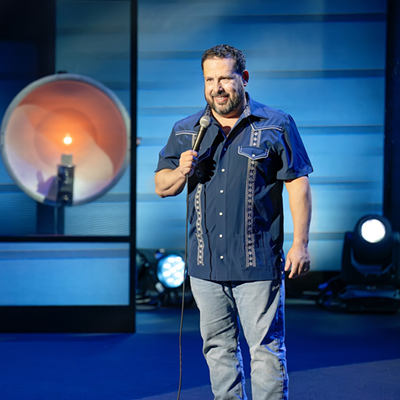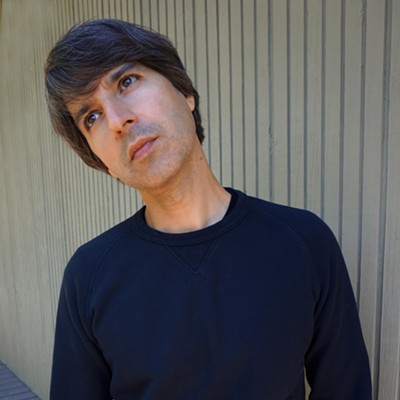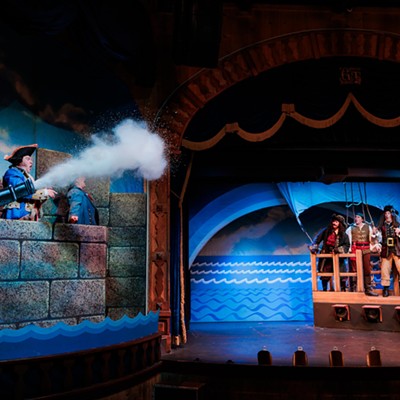We can't provide the answer, but we can tell you this is just one line from one song in King's enormous vault of funny, inspiring and thought-provoking compositions. After almost 40 years of songwriting, this parody-loving folk musician and activist has a lot of quirky metaphors and catchy tunes under his belt--and he's always coming up with more.
As one can tell from his music, King has powerful convictions. Today, he's decidedly left-leaning, but he declares that one of his most potent influences came from his idealistically right-wing father. Throughout his early youth, King embraced the concept of social responsibility, but was more familiar with the beliefs of Barry Goldwater than those of Emma Goldman.
Then came the Civil Rights movement and the Vietnam War. King faced the draft, became a conscientious objector and left his father's politics behind--without abandoning his father's notion that in a democratic society, citizens are responsible for being informed and staying active.
King's first activist musical contribution came in 1971 when he lived in New York City, and the subway fare was raised from 35 to 50 cents. In protest, he wrote a song called "Walk Through the Gate and Hop Over the Turnstyle"--sung to the tune of "Waltzing Matilda"--and played it in subway stations. Soon enough, the song was picked up by local station WBAI and became his first "radio hit."
Since then, King's musical storytelling and political satire have confronted much bigger issues, from the environment to war, and his songs have been covered by folk-music big-shots like Pete and Peggy Seeger, John McCutcheon and Arlo Guthrie. He has received several awards, released a dozen solo albums, recorded three albums with his touring ensemble and made numerous compilations with other artists. According to Pete Seeger, he's "one of the finest singers and songwriters of our time."
Of course, King doesn't perform music for the kudos--he does it for the positive effects music can have.
"The most important function of any kind of art is to open people's hearts and minds," he declares. "And when people are involved in acting for social justice, flexing their democratic muscles against the status quo, it takes a lot of energy and courage and hope. Good political art, especially music, provides encouragement and insight and a sense of historical perspective that encourages people to work for change in a system that resists change."
Those views are what have prompted King to sing in support of numerous social-change organizations, some of which are located right here in Tucson. In fact, King has been coming to Tucson yearly since 1979, and our city may contain one of his biggest and most enthusiastic followings. When he played in support of the Primavera Foundation one year, almost 400 people showed up--and lately, he's been drawing a crowd of at least 250.
This year, King's cause is health care for those in need. His concert will recognize and raise money for Clinica Amistad, a local clinic that provides free integrative primary and preventative health care to people without insurance. Since its inception almost five years ago, Clinica Amistad has built a great team of nurses and primary-care practitioners, and offers alternative-healing treatments like acupuncture and energy therapies; the clinic even hosts a "health promoter" who gives interactive talks about subjects like diabetes, nutrition and exercise. The number of people Clinica Amistad serves is growing exponentially: In 2007, it accommodated 2,058 patients, compared to only 1,564 the year before.
"Tucson is just one part of a nationwide mega-fiasco," says the Rev. Ricardo Elford, Clinica Amistad's clinic coordinator. "Nearly 50 million people are without health insurance. Of course, free clinics for the uninsured cannot care for tens of millions of people. ... But I think free clinics, wherever they are in the land, are good reminders that health care is a human right."
That's why Tucson's own Ted Warmbrand, one of Charlie King's oldest friends--and a folk musician and activist himself--organized this event.
"The whole point of these concerts," he says, "is to bring different people together and find a way to build a caring community that doesn't leave anybody out. There's so much illness that needs attention, and there's so much (of a) lack of care; this just strikes me as a good thing to do."
While the concert itself is free, donations are appreciated, and there will be raffles offering great prizes donated by local businesses, from trees to clothing to art. In addition, Casa Maria--a local Catholic organization that serves the homeless and poor--will provide a free vegetarian meal.
"This is going to be a painless and fun way to help," asserts Warmbrand. "In all our years of concerts, we've never not met a community need. Charlie writes songs about ordinary people doing extraordinary things. ... In certain circles, he's a must-see."
The Charlie King Free Annual Benefit Meal and Concert will be held Saturday, Feb. 2, at the Unitarian Universalist Church, 4831 E. 22nd St. Dinner begins at 6 p.m., with music starting at 7:30. The event is free.







